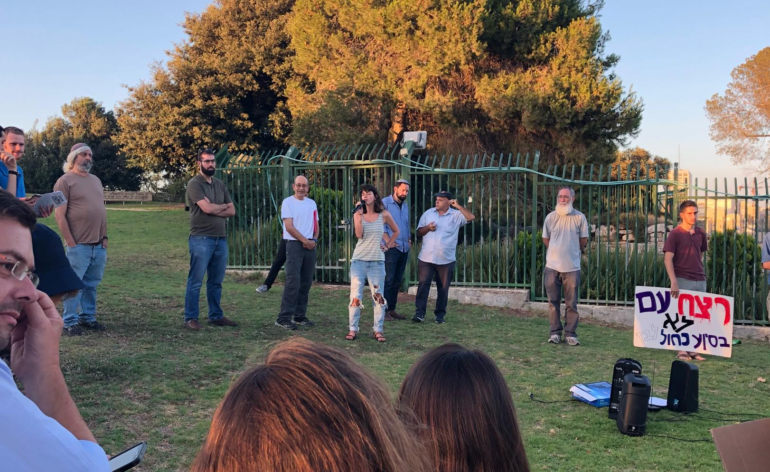A few dozen activists protested outside Israel’s Knesset Tuesday evening to call on Israel’s political leaders to halt arms sales to nations violating human rights.
The protest was led by veteran activist Elie Yosef, who has been leading a growing movement of Israelis from across the political spectrum to raise awareness and pressure politicians on the issue.
Yosef, who began a hunger strike on Tuesday, told journalists that the goal of the rally was to mobilize people over the next two weeks to call lawmakers and convince them to support legislation that would require the Knesset to establish an oversight committee for arms sales to foreign countries.
Member of Knesset Hilik Bar (Zionist Union) agreed to propose the bill after Yosef threatened to hunger strike outside his home. Yosef said that Bar and many other lawmakers agree with his opposition to arming regimes guilty of human rights violations but are afraid to challenge Israel’s defense community.
“We need to create pressure from below to counter the pressure from above,” said activist Yehuda HaKohen of the BRIT ḤAZON movement. “Our politicians are understandably intimidated by the defense industry and the people need to create equally powerful pressure from below. If Knesset members see that the public cares about this issue, there more likely to take positions and stand up to the weapons companies.”
The legislation, which MK Bar has not yet submitted to the Knesset, would require the formation of a committee to take into account ethical considerations when issuing an export license to a weapons manufacturer and instruct the defense ministry and other government authorities which countries Israel can and cannot sell arms to.
According to activist Rabbi Avidan Freedman, there have been several instances in recent years in which Israel has exported weapons to states with poor human rights records.
In 2017, the Myanmar military made public their purchase of three Super Dvora MK III patrol boats manufactured by Israel Aerospace Industries, reportedly with weapons systems installed.
According to human rights groups, ethnic cleansing against the Rohingya Muslim minority in Myanmar’s northern region began in late 2016, and over 900,000 Rohingya have fled the country since 2015 to due to a campaign of mass arson, rape, massacres and other atrocities carried out by Myanmar security forces.
In August 2016, the Israeli global defense contracting company Tar Ideal Concept Ltd. published pictures on their website of Myanmar forces training with the Israeli-manufactured CornerShot rifle, ostensibly with Israeli trainers.
A document it published with the pictures was entitled “Israeli Corner – shot now in service in Myanmar’s Special Operations Task Force.”
ACE Galil assault rifles manufactured by Israel Military Industries have also been sold to South Sudan, where atrocities have been carried out since a civil war began in 2013, although the rifles were likely sold before the violence broke out.
Export licenses for arms sales to foreign countries are not made public so strict monitoring has been difficult.
Freedman said that the activists are not against Israel’s arms industry but simply object to exporting weapons to countries that are known to abuse human rights and should therefore come under heightened inspection.
As the protest was winding down, HaKohen told Vision Magazine that the issue transcends beyond arms sales and touches the very core of what it means to have a “Jewish state.”
“We need to ask ourselves if selling arms to human rights abusers is really an expression of the Jewish values we want our state to represent,” he said. “Now that we’ve come home and established a Jewish state, we need to figure out what that means in terms of values.”
“Many of our leaders currently look to the imperial powers for moral guidance. But does America profiting from conflicts throughout the world, including our conflict with the Palestinians, justify emulating such behavior? Shouldn’t Israel strive to be a moral leader rather than a follower on the world stage?”
When challenged on this issue last year, Defense Minister Avigdor Lieberman (Yisrael Beiteinu) argued that Israel “subordinates [itself] to the entire enlightened world, that is the Western states, and first of all the United States, the largest arms exporter.”
Elie Yosef and the other activists involved are doing the Jewish people a tremendous service by forcing this issue into the light. Israeli society and the broader Jewish world need to have a serious discussion on whether profiting from the blood of innocent people is truly an expression of the values we built our state to manifest.





